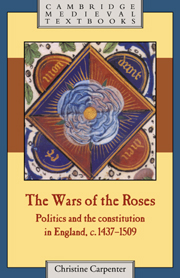Book contents
- Frontmatter
- Contents
- List of illustrations
- Preface
- Introduction
- 1 Sources and historiography
- 2 The governance of England in the fifteenth century I: kings, kingship and political society
- 3 The governance of England in the fifteenth century II: nobility, gentry and local governance
- 4 The Lancastrian kings to c. 1437
- 5 Henry VI's adult rule: the first phase c. 1437–1450
- 6 The road to war: 1450–145
- 7 The end of Lancastrian rule: 1455–1461
- 8 Edward IV's first reign: 1461–1471
- 9 The triumph of York: 1471–1483
- 10 Richard III and the end of Yorkist rule: 1483–1485
- 11 Henry VII and the end of the wars: 1485–1509
- 12 Conclusions
- Bibliographical notes
- Index
- Cambridge Medieval Textbooks
9 - The triumph of York: 1471–1483
Published online by Cambridge University Press: 05 June 2012
- Frontmatter
- Contents
- List of illustrations
- Preface
- Introduction
- 1 Sources and historiography
- 2 The governance of England in the fifteenth century I: kings, kingship and political society
- 3 The governance of England in the fifteenth century II: nobility, gentry and local governance
- 4 The Lancastrian kings to c. 1437
- 5 Henry VI's adult rule: the first phase c. 1437–1450
- 6 The road to war: 1450–145
- 7 The end of Lancastrian rule: 1455–1461
- 8 Edward IV's first reign: 1461–1471
- 9 The triumph of York: 1471–1483
- 10 Richard III and the end of Yorkist rule: 1483–1485
- 11 Henry VII and the end of the wars: 1485–1509
- 12 Conclusions
- Bibliographical notes
- Index
- Cambridge Medieval Textbooks
Summary
In the aftermath of the Readeption, the first need was to secure the kingdom, the second, related, one to issue rewards and punishments. Fauconberg submitted at the end of May and was pardoned, but was eventually executed for some other unknown offence in September. In July a commission dominated by the Bourchiers, the leading family in the area, dealt with the south-eastern counties that had supported Fauconberg's rising. In the same month Hastings became commander of Calais, which had come under Warwick's control during the Readeption. By offering pardons for Warwick's main supporters there and wages for the garrison, he was readily admitted. He returned with Montagu's heir, the young duke of Bedford, who had been sent to Calais during the Readeption. Wales took longer to deal with and, even after Jasper Tudor had left in September, it remained in a disordered and unstable condition. In 1473 raids from France by the earl of Oxford, who had escaped from Barnet, culminating in the seizure of St Michael's Mount, were the last whimpers of Lancastrian resistance. Oxford capitulated at the end of the year, was pardoned yet again and imprisoned in Hammes Castle, one of the English possessions in France. Now that he was fully in command for the first time, Edward could afford to be free with both vengeance and mercy, and it is typical of him that, as with Oxford, on the whole he chose mercy.
- Type
- Chapter
- Information
- The Wars of the RosesPolitics and the Constitution in England, c.1437–1509, pp. 182 - 205Publisher: Cambridge University PressPrint publication year: 1997

